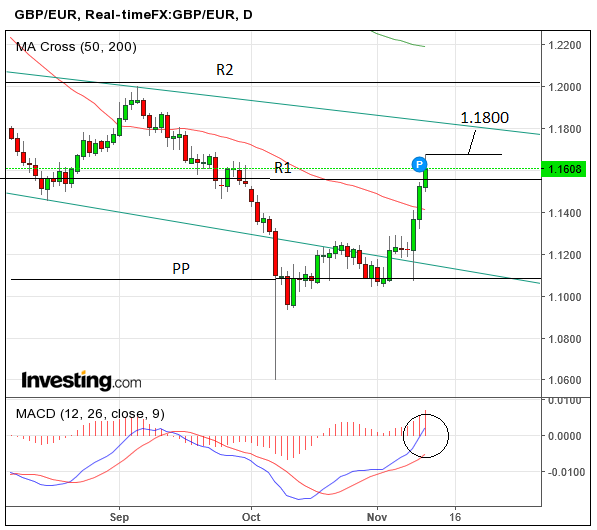Overbought British Pound to Fade Gains Against the Euro But Still Positively Aligned

The Pound to Euro exchange rate has fallen back below 1.16 as the strong rally higher finally starts to run out of steam but the pullback should be mild if our studies are correct.
- GBP to EUR exchange rate today: 1 GBP = 1.1590 EUR, 24-hour best rate: 1.1654
- EUR to GBP exchange rate today: 1 EUR = 0.8628 GBP, 24-hour best rate: 0.8631
Pound Sterling has been rising against the Euro since the start of November with the GBP/EUR has risen strongly, breaking above the key 50-day moving average, and rising all the way up to its current levels just north of 1.1600.
This break of the 50-day moving average is a positive momentum signal that would advocate for further gains on a multi-day, even multi-week basis.
As such, the short-term trend has changed from down to up and supports further growth:
The MACD momentum indicator in the bottom pane has moved above the zero line indicating more upside is on the cards.
A robust support level lies at 1.1585 underpinning price at its current level.
We expect to see more upside eventually towards the next target at the level of the trendline at 1.1800.
A break above the current highs at 1.1680 would confirm such a move higher.
However a loss of upside momentum and prospect of a retracement at the time of writing confirms the pair is now looking oversold.
According to RSI studies the GBP/EUR looks increasingly overbought with a reading at 73 - anything above 70 denotes oversold conditions and for the reading to break back below 70 we would require a retracement or sideways trade.
"Momentum is likely to ease in the short term,” says a note from the foreign exchange strategy team at Danske Bank of the Pound. “In our view, weak UK fundamentals still justify a weak GBP to offset the negative consequences of a Brexit.”

GBP/EUR
Daily Chart Showing live Inter-Bank Rate and Indicative Rates for International Payments.
Political Anxieties Could see Shared Currency Underperform
With the United States and United Kingdom out of the way when it comes to delivering political shocks the ball lands in the Eurozone's court.
Political uncertainty weighs on the outlook for the future of the currency in the run-up to a referendum in Italy and a presidential election in Austria.
Having witnessed the unexpected ascendancy of Donald Trump in the US concerns are mounting that similar populist, right-leaning, nationalist vote will emerge in Europe.
"Trump's victory in the U.S. has been viewed as a victory for nationalism and in the past few days, support for Italy's referendum on Senate reform has plunged sharply. The NO vote is now leading and the fear is that it could lead to resignation of Prime Minister Renzi and a possible Italian - exit from the European Union," says Kathy Lien, Director at BK Asset Management.
Lien notes that Trump's win also boosted the chance for Marine Le Pen, France's far-right leader to become their next President.
The idea that the current political order has alienated the majority of citizens in Western society is becoming an increasingly popular one.
Such an occurrence could further undermine the integrationary agenda that underlines the European project and the Euro.
Fears of Impending Eurozone Political Shocks Overblown
However, not everyone is convinced by the argument that the US is facing a populist surge which would in turn threaten the Euro.
"Much of the media love a contagion story. Here is what has driven me completely mad: Even otherwise well informed media have drawn parallels between Trump (after Brexit) and the upcoming Italian referendum. As you hopefully know, the Italian referendum is about simplifying governance and has absolutely nothing to do with populism," argues Eric Nielsen at UniCredit.
Nielsen hopes Renzi wins the referendum because it’ll then become easier to get reforms through, but if he doesn’t, Nielsen argues it’ll be “more of the same”, rather than a sign of any “populist wave”.
"Certainly, the several respected Italians who, for various reasons, say they’ll vote “no”, would surely object to being thought of as part of a populist wave," says Nielsen.
The UniCredit analyst also points to the electoral system in Europe as being one that protects against unexpected shifts in power.
"While there is good evidence that some European countries include a bigger share of extreme-leaning voters than, say, maybe the 14% in the US (I’m generously guessing that half the Trump votes were extreme protest votes), any fraction of extremists below 30%-40% won’t come to significant power in Europe because of our different electoral systems," says Nielsen.
GBP, meanwhile, has become the darling of markets in the post-Trump era, after Trump pledged he would put the UK at the ‘front of the queue’ in any trade deal negotiations.
UK long-dated gilts yields have also risen notably of late which has created a pull on the Pound which has for too long been trading below fair-value estimates based on yield differentials.
Data to Watch this Week for the Pound
The main release for the Pound in the coming week is CPI (yoy) in October, which is forecast to rise 1.1% in October (from 1.0% previously), and is published at 9.30 (GMT) on Tuesday, November 15.
Inflation already showed a strong 1.0% rise in September and if it continues to increase it will probably lead to an appreciation in Sterling as it will lessen the probabilities of the Bank of England (BoE) cutting interest rates in December.
It is now almost a given that inflation at home will rise on the back of GBP depreciation and that the BoE will see through that – although, as BoE governor Mark Carney has mentioned, “there are limits to the extent to which above-target inflation can be tolerated”.
Markets are actually now starting anticipating the next move at the Bank will be to raise interest rates as it tries to put a lid on inflation.
This is, all things being equal, a positive for Sterling.
Average Earnings on Wednesday may also be significant as an indicator of inflation pressures.
A rise of 2.4% in wages (excluding Bonuses) is forecast in the data from September.
The data is released along with the Unemployment Rate and Claimant count (expected to show a rise of 2k jobs) on Wednesday, November 15 at 9.30.
The week rounds off with Retail Sales on Thursday at 9.30.
The data for October is expected to show a 0.5% rise month-on-month.
"Ffocus of the week ahead will be on Britain's economy that has so shown signs of weathering Brexit uncertainty. U.K. inflation on Tuesday is forecast to rise, unemployment on Wednesday is expected to steady inside of 5 percent, while faster spending is on the cards for retail sales on Thursday," says Joe Manimbo at Western Union.
Data to Watch for the Euro
Again, inflation will be key for the Euro with Friday seeing the second estimate of October CPI.
The preliminary result came out at 0.5% and expectations are for this to be mirrored by the second estimate.
Clearly, this may have important implications for European Central Bank (ECB) monetary policy going forward.
A fall would indicate further deflation and increase the chances of further stimulus from the ECB.
Monday sees speeches from ECB’s Draghi and Praet at 13.45 and 18.45 (GMT) respectively.
Tuesday also sees the German and Eurozone ZEW sentiment index out at 10.00, which is considered a good indicator of future growth.
The ZEW is composed of interviews with financial professionals and is considered a good leading index.
The ZEW is likely to follow a generally improving trend in sentiment data in the Eurozone, according to Commerzbank’s Rolph Solvene:
“The recent improvement in business sentiment –the Ifo business climate and the purchasing managers’ index have increased noticeably of late – inspires hope that this will not change in the coming months.
“As a consequence, sentiment among analysts has improved; the Sentix index already reflected this (chart 7), and the ZEW index will likely follow in the week ahead, rising nearly 10 points to 15 points.”
German 3rd quarter GDP at 07.00 is expected to come out at a sluggish 0.3% from 0.4% previously.
Commerzbank’s Solvene, meanwhile, thinks it will probably undershoot and come out at 0.2%.
The Economic Calendar
Monday, 14 November
02:00 – China industrial production
10:00 – Eurozone industrial production
10:00 – UK inflation report hearings
Tuesday, 15 November
12:30 – Reserve Bank of Australia meeting minutes
07:00 – German preliminary Q3 GDP data
09:30 – UK inflation CPI inflation
10:00 – Eurozone flash GDP
13:30 – US retail sales
Wednesday, 16 November
09:30 – UK unemployment, wages
13:30 – US producer price inflation
15:30 – US crude oil inventories
Thursday, 17 November
00:30 – Australia unemployment data
09:30 – UK retail sales
09:30 - Eurozone CPI inflation
12:30 – ECB monetary policy meeting accounts
13:30 – US CPI inflation, weekly unemployment, Philly Fed manufacturing
Friday, 18 November
13:30 – Canada CPI inflation







